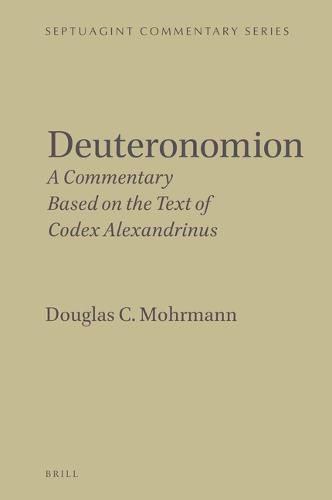Readings Newsletter
Become a Readings Member to make your shopping experience even easier.
Sign in or sign up for free!
You’re not far away from qualifying for FREE standard shipping within Australia
You’ve qualified for FREE standard shipping within Australia
The cart is loading…






This commentary on Deuteronomion is based on Codex Alexandrinus, the single best complete witness to the Old Greek. It features a new transcription of the manuscript with a fresh translation that treats Deuteronomion as a sacred text that would have been read, studied, and cherished in a worshipping community. Notations of important variants with the other key manuscripts, such as p848, p963, and B (Vaticanus), appear regularly. This commentary represents an interpretative adventure, intentionally giving room for varied ancient reader-responses, and accordingly it functions within several literary spaces. First, it recognizes the substantial intratextual features between the book's narrative framing and its legal materials. Deuteronomion is also read in its hypotextual relation with the Pentateuch's other narratives and legal materials, chiefly within Exodus, Leviticus, and Numbers. Sensitivity to the Greek linguistic climate, the so-called koine Greek, is another space. Finally, and most distinctively, this commentary adds to its reading the many voices who read and used Deuteronomy, in either Hebrew or Greek forms, from the late Second Temple Period.
$9.00 standard shipping within Australia
FREE standard shipping within Australia for orders over $100.00
Express & International shipping calculated at checkout
This commentary on Deuteronomion is based on Codex Alexandrinus, the single best complete witness to the Old Greek. It features a new transcription of the manuscript with a fresh translation that treats Deuteronomion as a sacred text that would have been read, studied, and cherished in a worshipping community. Notations of important variants with the other key manuscripts, such as p848, p963, and B (Vaticanus), appear regularly. This commentary represents an interpretative adventure, intentionally giving room for varied ancient reader-responses, and accordingly it functions within several literary spaces. First, it recognizes the substantial intratextual features between the book's narrative framing and its legal materials. Deuteronomion is also read in its hypotextual relation with the Pentateuch's other narratives and legal materials, chiefly within Exodus, Leviticus, and Numbers. Sensitivity to the Greek linguistic climate, the so-called koine Greek, is another space. Finally, and most distinctively, this commentary adds to its reading the many voices who read and used Deuteronomy, in either Hebrew or Greek forms, from the late Second Temple Period.